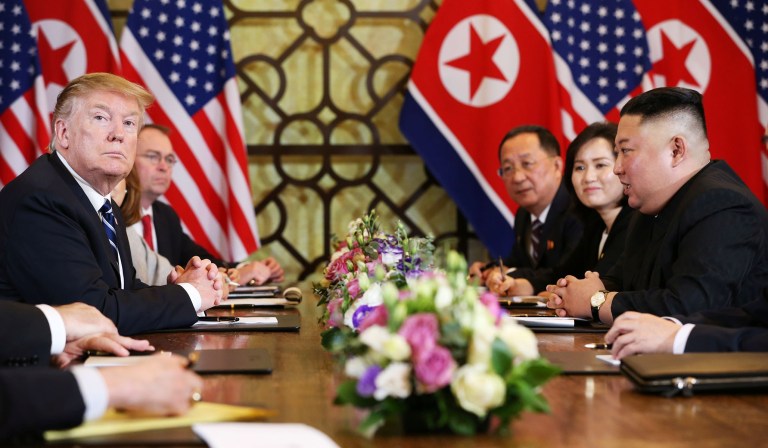Call Out North Korea’s Human Rights Record
Both liberty and American leadership in Asia depend on President Trump speaking clearly about the true nature of North Korea.

Just over a year ago, President Trump stood before Congress and told the story of Ji Seong-ho, a North Korean defector who suffered at the hands of that brutal Communist regime. This week, the president stood next to North Korea’s ruler and refused to address Kim Jong-un’s abysmal record on human rights.
His silence in Hanoi was a strategic error at a time when authoritarianism is on the rise in East Asia. It encourages nations that believe they can terrorize their citizens — and perhaps their neighbors — without fear of American condemnation. Both the future of liberty and American leadership in Asia depend on President Trump once more drawing attention to the true nature of North Korea.
Initially, President Trump spoke accurately and eloquently about North Korea’s utter disregard for human rights, avoiding the topic only once the summits began. Those early statements focused the world’s attention on Pyongyang’s inhumanity, putting renewed pressure on Kim to come to the table. The criticisms still hold true, because North Korea is more concentration camp than country.
The facts should be repeated as often as possible. The Kim regime operates a gulag system that would make its old Soviet founders proud. Recent estimates put the number of prisoners at up to 120,000 in the four largest camps alone. Few ever escape, but those who do remember widespread torture, public executions, and mothers forced to drown their newborn infants.
Outside the gulags, life is usually less violent, but no more free. Like all Communist regimes, North Korea’s bill of rights is a worthless document ignored by the state. In daily life, there is no freedom of speech or assembly, no right to privacy or protest, and no respect for conscience or religion — especially Christianity, for which the Kim regime holds special hatred. Only those citizens whose families show absolute loyalty are allowed to live in major cities, although a single misstep can cast them back into the countryside to a life of poverty, malnutrition, and even death.
North Korea’s oppression at home is tied to its aggression abroad. Nations that tyrannize their own citizens rarely have qualms about attacking their neighbors, which is precisely why human rights must be part of the denuclearization discussion. You cannot divide foreign and domestic policy in Communist thought. They are two halves of the same tumor; you can cut one half away, but it will grow back given time. And that is why the silence on the nature of the evil is so concerning.
Marion Smith is the executive director of the Victims of Communism Memorial Foundation, an educational and human-rights non-profit authorized by a unanimous act of Congress. @smithmarion

